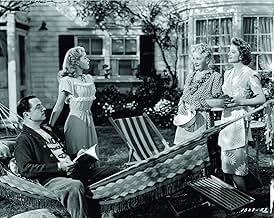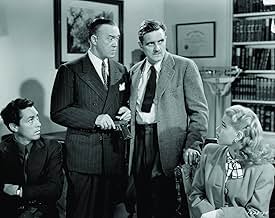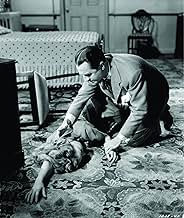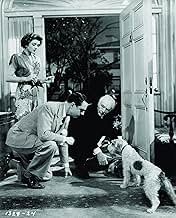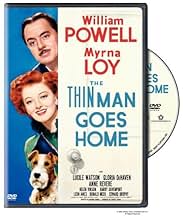PUNTUACIÓN EN IMDb
7,3/10
6,6 mil
TU PUNTUACIÓN
Añade un argumento en tu idiomaNick, a private detective, visits his hometown with wife Nora. Locals believe he's investigating a case. When someone is murdered on his doorstep, Nick gets embroiled in solving the crime de... Leer todoNick, a private detective, visits his hometown with wife Nora. Locals believe he's investigating a case. When someone is murdered on his doorstep, Nick gets embroiled in solving the crime despite intending a vacation.Nick, a private detective, visits his hometown with wife Nora. Locals believe he's investigating a case. When someone is murdered on his doorstep, Nick gets embroiled in solving the crime despite intending a vacation.
- Dirección
- Guión
- Reparto principal
Gloria DeHaven
- Laura Ronson
- (as Gloria De Haven)
Anita Sharp-Bolster
- Hilda
- (as Anita Bolster)
Reseñas destacadas
It's 1945, the trains are packed with people, Asta doesn't remain hidden under Nora's fur coat so Nick, Nora and Asta end up in the baggage car as they travel to Nick's home town. And Nick is drinking only cider - his father never approved of drink. Thus begins, "The Thin Man Goes Home," made as the war was ending and a lot of people whose lives had changed were thinking about going home.
Nick, it turns out, has an uneasy relationship with his doctor dad because he himself never became a doctor. When the inevitable mystery arises around a murder, Nora wants Nick to solve it to impress his dad.
The fact is, the scripts of "The Thin Man" series never mattered. It was always the acting and interaction of William Powell and Myrna Loy, and here, as usual, they're great - loving, flippant, and funny. Since Nick is always falling on the floor or getting hit on the head, it's hard for anyone to believe he's sober. At a charity dance, in order to do some investigating, he gives his dance tickets to a sailor and Nora becomes his partner. The dance scene is hilarious as the sailor tosses Nora all over the place and swings her around with the kind of maneuvers you see in pair figure skating.
The war is still on so the story involves espionage. A very young Gloria de Haven does nicely as a self-consciously over-dramatic young woman; Harry Davenport and Lucile Watson are great as Nick's parents; and the later blacklisted Anne Revere does a fine job as Crazy Mary.
William Powell could read the phone book with class and humor; Loy looks beautiful and their teamwork has never been better. Highly recommended.
Nick, it turns out, has an uneasy relationship with his doctor dad because he himself never became a doctor. When the inevitable mystery arises around a murder, Nora wants Nick to solve it to impress his dad.
The fact is, the scripts of "The Thin Man" series never mattered. It was always the acting and interaction of William Powell and Myrna Loy, and here, as usual, they're great - loving, flippant, and funny. Since Nick is always falling on the floor or getting hit on the head, it's hard for anyone to believe he's sober. At a charity dance, in order to do some investigating, he gives his dance tickets to a sailor and Nora becomes his partner. The dance scene is hilarious as the sailor tosses Nora all over the place and swings her around with the kind of maneuvers you see in pair figure skating.
The war is still on so the story involves espionage. A very young Gloria de Haven does nicely as a self-consciously over-dramatic young woman; Harry Davenport and Lucile Watson are great as Nick's parents; and the later blacklisted Anne Revere does a fine job as Crazy Mary.
William Powell could read the phone book with class and humor; Loy looks beautiful and their teamwork has never been better. Highly recommended.
All the Thin Man films are great to watch, but this is one with which I find a bit easier to identify. Riskin, the writer of this film and long time scriptwriter for Frank Capra, was also the guy who wrote "It Happened One Night" and "Meet John Doe". This New York City born writer's attraction to average Joe small town values over Cosmopolitan glitz and decadence obvious in those two films is plain to see here. This is probably the image a lot of successful urbanites had about moving to the suburbs after WW2.
This is sort of an odd bird among Thin Man films in a couple of ways. First of all, Nick is astonishingly sober for a change. Don't look for any of those scenes of Nick and Nora trying to drink each other the table at some New York nightclub in this one. In fact, the nightclubs and high rises are totally gone as Nick takes Nora the glamorous New York socialite back for a visit to Nick's hometown, which bears a fairly strong likeness to Andy Hardy's. Nick's father is a retired M.D. not unlike the ones in the Norman Rockwell paintings. He wanted Nick to follow in his footsteps as a small town doctor instead of becoming a big city policeman and this is the first time the two of them have gotten together in years. This father-son reconciliation is the explanation for Nick's sudden uncharacteristic attraction to a sober, healthy lifestyle.
Nick's father is actually fairly proud of Nick and keeps a scrapbook about all his adventures. The whole town knows about Nick Charles the famous Detective. I sort of see invisible images of G.I.s returning home from WW2 in a lot of this movie. Nick's celebrity as a tough, smart local boy who went off to bring gun toting gangsters to justice in the big city of aristocratic sophisticates and Broadway nights is not very far removed from how most Americans probably saw the guys who went off to liberate Paris and Europe in WW2. Nora fits into that picture as a sort of "Mrs. Miniver" figure of what American's admired about European sophication brought back home to meet the folks.
The homecoming hero vision of Nick peacefully turning into a happy coach potato in a post war suburbia however is not what we want to see. What everybody loves about the Thin Man films is their contrary to Hollywood stereotype revelation that life after marriage can actually be exciting. Nora decides to get Nick off the coach with an "I Love Lucy" sort of plot twist that spreads a rumor around town that Nick is secretly working on a detective case. The result of course is that all the various local characters with small town secrets to hide think he's after them and all the mystery murders and skeletons start coming out of the closet like we've all been waiting to see. Nick and Nora are such a fun couple, aren't they?
This is sort of an odd bird among Thin Man films in a couple of ways. First of all, Nick is astonishingly sober for a change. Don't look for any of those scenes of Nick and Nora trying to drink each other the table at some New York nightclub in this one. In fact, the nightclubs and high rises are totally gone as Nick takes Nora the glamorous New York socialite back for a visit to Nick's hometown, which bears a fairly strong likeness to Andy Hardy's. Nick's father is a retired M.D. not unlike the ones in the Norman Rockwell paintings. He wanted Nick to follow in his footsteps as a small town doctor instead of becoming a big city policeman and this is the first time the two of them have gotten together in years. This father-son reconciliation is the explanation for Nick's sudden uncharacteristic attraction to a sober, healthy lifestyle.
Nick's father is actually fairly proud of Nick and keeps a scrapbook about all his adventures. The whole town knows about Nick Charles the famous Detective. I sort of see invisible images of G.I.s returning home from WW2 in a lot of this movie. Nick's celebrity as a tough, smart local boy who went off to bring gun toting gangsters to justice in the big city of aristocratic sophisticates and Broadway nights is not very far removed from how most Americans probably saw the guys who went off to liberate Paris and Europe in WW2. Nora fits into that picture as a sort of "Mrs. Miniver" figure of what American's admired about European sophication brought back home to meet the folks.
The homecoming hero vision of Nick peacefully turning into a happy coach potato in a post war suburbia however is not what we want to see. What everybody loves about the Thin Man films is their contrary to Hollywood stereotype revelation that life after marriage can actually be exciting. Nora decides to get Nick off the coach with an "I Love Lucy" sort of plot twist that spreads a rumor around town that Nick is secretly working on a detective case. The result of course is that all the various local characters with small town secrets to hide think he's after them and all the mystery murders and skeletons start coming out of the closet like we've all been waiting to see. Nick and Nora are such a fun couple, aren't they?
Everybody has at least one skeleton in their closet, and Nick Charles is the man who can bring them out into the daylight. The fifth film in the excellent 'Thin Man' series sees our favourite married detectives, Nick and Nora Charles (William Powell and Myrna Loy), visiting Nick's parents in the small town of Sycamore Springs, a sleepy locale where everybody knows everybody and crime is practically non-existent
or so they thought! The famous detective's arrival is greeted with a wave of controversy, despite his own insistence that the visit is merely a quiet vacation. With everybody under the impression that Nick is investigating an important case, long-forgotten skeletons begin to emerge from their hiding-places, a young artist is shot dead on the doorstep and an ordinary-looking painting of a windmill becomes a vital clue in identifying his murderer.
'The Thin Man Goes Home' was the first film in the series not directed by W.S. Van Dyke, after he committed suicide in February 1943. Nonetheless, Richard Thorpe does a good job of recreating the mystery and good humour of the previous instalments, working off a script from Robert Riskin, Harry Kurnitz and Dwight Taylor. There are also a few notable adjustments to the usual formula: the action takes place in a small town rather than the city, and Nick Charles has gone completely teetotal {no doubt a consequence of the WWII liquor rationing}. Aside from obviously solving the mystery and apprehending the killer, the film has another important sub-plot concerning Nick and his disapproving father. Nora makes it her goal to convince Dr. Charles (Harry Davenport) that his son is, indeed, a detective genius, and fuels the rumours in a not-so-subtle fashion that he is here on a case. However, his father won't believe that Nick has gone off drinking, and various unfortunate moments of bad-timing do little to prove him otherwise.
Of course, the main reason we watch 'The Thin Man' movies is to enjoy the witty banter and playful rivalry between husband and wife, and a lot of it is still here, even if it takes a back-seat to the murder mystery itself. Just like the audience, Nora believes that she understands Nick's mystery-solving tactics to the letter, and she enthusiastically narrates his technique to the attentive Dr. Charles, occasionally tossing in her own opinion of the identity of the killer. Of course, she's almost always wrong. This mystery is a muddled affair, with seemingly everyone guilty for at least something, but it's the killer's name that proves a real surprise.
'The Thin Man Goes Home' was the first film in the series not directed by W.S. Van Dyke, after he committed suicide in February 1943. Nonetheless, Richard Thorpe does a good job of recreating the mystery and good humour of the previous instalments, working off a script from Robert Riskin, Harry Kurnitz and Dwight Taylor. There are also a few notable adjustments to the usual formula: the action takes place in a small town rather than the city, and Nick Charles has gone completely teetotal {no doubt a consequence of the WWII liquor rationing}. Aside from obviously solving the mystery and apprehending the killer, the film has another important sub-plot concerning Nick and his disapproving father. Nora makes it her goal to convince Dr. Charles (Harry Davenport) that his son is, indeed, a detective genius, and fuels the rumours in a not-so-subtle fashion that he is here on a case. However, his father won't believe that Nick has gone off drinking, and various unfortunate moments of bad-timing do little to prove him otherwise.
Of course, the main reason we watch 'The Thin Man' movies is to enjoy the witty banter and playful rivalry between husband and wife, and a lot of it is still here, even if it takes a back-seat to the murder mystery itself. Just like the audience, Nora believes that she understands Nick's mystery-solving tactics to the letter, and she enthusiastically narrates his technique to the attentive Dr. Charles, occasionally tossing in her own opinion of the identity of the killer. Of course, she's almost always wrong. This mystery is a muddled affair, with seemingly everyone guilty for at least something, but it's the killer's name that proves a real surprise.
The Thin Man Goes Home find's Nick and Nora Charles visiting Nick's parents in their small New England town. The parents are Harry Davenport and Lucile Watson and Davenport has never gotten quite over the fact that Bill Powell did not choose to follow him in the medical profession. And he disapproves of Powell's liquid lunches mightily. Powell goes on a spartan diet of apple cider though no one believes him and that's a source of a lot of the comedy in The Thin Man Goes Home.
Of course no one also believes that Powell could be in town on anything but business and his mere presence touches off one guy ready to confess to some illegal activity when he's shot to death right on the doorstep of Davenport. An espionage ring his uncovered during the course of the investigation and the murderer who is eventually uncovered is not someone we would suspect. Due to some falsification of evidence the murderer almost gets away with it.
Here's a hint for you though. Forensics here more than in any other Thin Man film plays a part in the solution leading Harry Davenport to be proud that his influence was for the good with Powell.
When World War II started Myrna Loy unlike any other female star in Hollywood completely abandoned her career to devote herself to work with the Red Cross and other civilian agencies. It was a sacrifice that no other star of her gender made during the war years. This film was the only one she made from Pearl Harbor to V.E. Day.
This fifth film of the Thin Man series is also the first made without director Woody Van Dyke who committed suicide when he was diagnosed with terminal cancer. One of MGM's able studio directors, Richard Thorpe, pinch hit admirably for Van Dyke.
Funniest scene in the film is when Powell ditches Loy onto a jitterbugging sailor while he investigates. Worth it to see that alone.
Of course no one also believes that Powell could be in town on anything but business and his mere presence touches off one guy ready to confess to some illegal activity when he's shot to death right on the doorstep of Davenport. An espionage ring his uncovered during the course of the investigation and the murderer who is eventually uncovered is not someone we would suspect. Due to some falsification of evidence the murderer almost gets away with it.
Here's a hint for you though. Forensics here more than in any other Thin Man film plays a part in the solution leading Harry Davenport to be proud that his influence was for the good with Powell.
When World War II started Myrna Loy unlike any other female star in Hollywood completely abandoned her career to devote herself to work with the Red Cross and other civilian agencies. It was a sacrifice that no other star of her gender made during the war years. This film was the only one she made from Pearl Harbor to V.E. Day.
This fifth film of the Thin Man series is also the first made without director Woody Van Dyke who committed suicide when he was diagnosed with terminal cancer. One of MGM's able studio directors, Richard Thorpe, pinch hit admirably for Van Dyke.
Funniest scene in the film is when Powell ditches Loy onto a jitterbugging sailor while he investigates. Worth it to see that alone.
The penultimate Thin Man movie has Nick & Nora visiting Nick's parents when, of course, a murder is committed. This one gives us a look at Nick's background, including that he grew up in a very MGM small town and that his doctor father is disappointed that Nick didn't follow in his footsteps. As the story progresses, the father learns to appreciate what a great detective Nick is. There's also a WWII spy angle and a recurring joke about Nick's newfound sobriety.
William Powell and Myrna Loy are great as ever with that fun chemistry we all love so much. One of my favorite Myrna Loy scenes in the entire series is the one here where she tells Nick's father about the Stinky Davis case. It's hilarious! Nick, Jr. is absent from this one but Asta is still around, albeit played by a different dog this time. The great supporting cast includes Lucille Watson, Harry Davenport, Lloyd Corrigan, Donald MacBride, Leon Ames, Edward Brophy, Helen Vinson, Donald Meek, Morris Ankrum, and a scenery-chewing Gloria DeHaven ("Just call me...Laurabelle."). It's the first Thin Man film not directed by Woody Van Dyke, who died in 1943. Perhaps that's why the movie has a different feel to it than prior entries in the series, although I'm sure we can most probably chalk it up to the changing times and tastes. More than a decade had passed since the first Thin Man film, after all. Still, it's an enjoyable movie that most fans of the series will love. It's hard to miss with Powell and Loy.
William Powell and Myrna Loy are great as ever with that fun chemistry we all love so much. One of my favorite Myrna Loy scenes in the entire series is the one here where she tells Nick's father about the Stinky Davis case. It's hilarious! Nick, Jr. is absent from this one but Asta is still around, albeit played by a different dog this time. The great supporting cast includes Lucille Watson, Harry Davenport, Lloyd Corrigan, Donald MacBride, Leon Ames, Edward Brophy, Helen Vinson, Donald Meek, Morris Ankrum, and a scenery-chewing Gloria DeHaven ("Just call me...Laurabelle."). It's the first Thin Man film not directed by Woody Van Dyke, who died in 1943. Perhaps that's why the movie has a different feel to it than prior entries in the series, although I'm sure we can most probably chalk it up to the changing times and tastes. More than a decade had passed since the first Thin Man film, after all. Still, it's an enjoyable movie that most fans of the series will love. It's hard to miss with Powell and Loy.
¿Sabías que...?
- CuriosidadesThis movie was to begin production in 1942, but Myrna Loy refused the part. Instead, she went to New York where she married car rental heir John Hertz Jr. and worked for the Red Cross war-relief effort. The movie almost began shooting with actress Irene Dunne as Nora Charles.
- PifiasIt has been said that the rifle in the film was a Bren gun and not a Japanese weapon. However, the Nambu machine gun looks very much like a Bren gun. The stock is the most easily spotted give-away. The Bren gun's stock come straight back from behind the pistol grip right behind the trigger guard, while the Nambu's stock has a slight drop to it, right behind the pistol grip. The gun in this film is, in fact, a Japanese Nambu machine gun.
- ConexionesFeatured in Twenty Years After (1944)
- Banda sonoraHappy Birthday to You
(uncredited)
Written by Mildred J. Hill and Patty S. Hill
Sung a cappella by Lucile Watson and Harry Davenport
Selecciones populares
Inicia sesión para calificar y añadir a tu lista para recibir recomendaciones personalizadas
Everything New on HBO Max in July
Everything New on HBO Max in July
Looking for something different to add to your Watchlist? Take a peek at what movies and TV shows are coming to HBO Max this month.
- How long is The Thin Man Goes Home?Con tecnología de Alexa
Detalles
- Fecha de lanzamiento
- País de origen
- Idioma
- Títulos en diferentes países
- El hombre delgado vuelve a casa
- Localizaciones del rodaje
- Empresa productora
- Ver más compañías en los créditos en IMDbPro
Taquilla
- Presupuesto
- 1.000.000 US$ (estimación)
- Duración1 hora 40 minutos
- Color
- Relación de aspecto
- 1.37 : 1
Contribuir a esta página
Sugerir un cambio o añadir el contenido que falta

Principal laguna de datos
What is the Spanish language plot outline for El regreso de aquel hombre (1944)?
Responde


